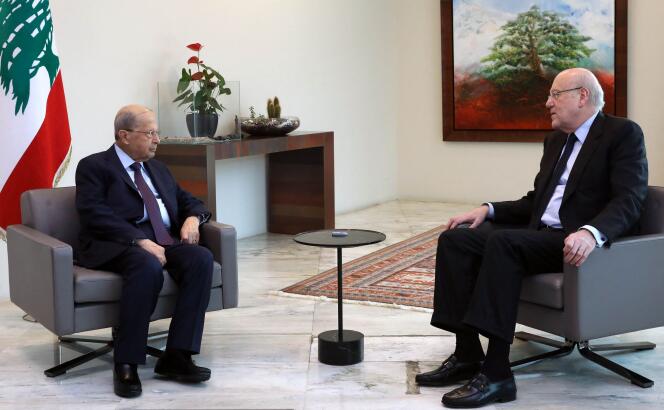

The announcement of an agreement in principle between the International Monetary Fund (IMF) and Lebanon on Thursday, April 7, the first concrete step in two years towards the release of an aid plan, was welcomed in the country of Cèdre and its foreign sponsors. It has also sparked skepticism among those who question the leaders’ ability to implement reforms that have so far been shelved and require the signing of a final agreement. “This is a very important step and a first step, but we have a lot of work ahead of us, given the complicated problems Lebanon faces.” acknowledges Saadé Chami, the Lebanese chief negotiator and deputy prime minister, one of the main architects of this agreement.
At stake is the pledge of aid of $3 billion (€2.8 billion) over four years under the IMF’s expanded credit mechanism. This aid is now considered the only way out of one of the worst crises in Lebanon’s history, when the national currency lost 90% of its value and 80% of the population plunged into poverty. It is also, stressed the Prime Minister, Najib Mikati, “a visa for donor countries to work with Lebanon and put it back on the map of the global financial world.” With on the horizon the potential allocation of the $11 billion in loans and donations pledged at the Economic Conference for Lebanon’s Development through Reform and with Business (Cedre), in Paris in 2018 – an amount that has never been disbursed, for lack of credible reforms on the Lebanese side.
Nothing is acquired. The aid plan must first be approved by the IMF’s board of directors and its board of directors. To this end, the Lebanese party has pledged to comply with a series of conditions. First, there is the passing of laws on the 2022 budget, capital controls, banking secrecy and bank resolution. The government should also unify exchange rates and introduce a floating exchange rate against the dollar. It needs to develop a fiscal strategy, as well as strategies for restructuring the banking sector and the external public debt. Finally, reforms are expected in the areas of taxes, pensions and even energy.
“The question of political acceptability”
The schedule is tight. Parliamentary elections are due to be held on 15 May, after which the government will only manage current affairs until the inauguration of a new cabinet, usually a source of lengthy political negotiations. “There are conditions that can be met before the elections, others that will take more time. In any case, we will try to hand over all the documents to Parliament so that the new Chamber can vote on them.” explains Mr. Chami.
You still have 52.94% of this article to read. The following is for subscribers only.



